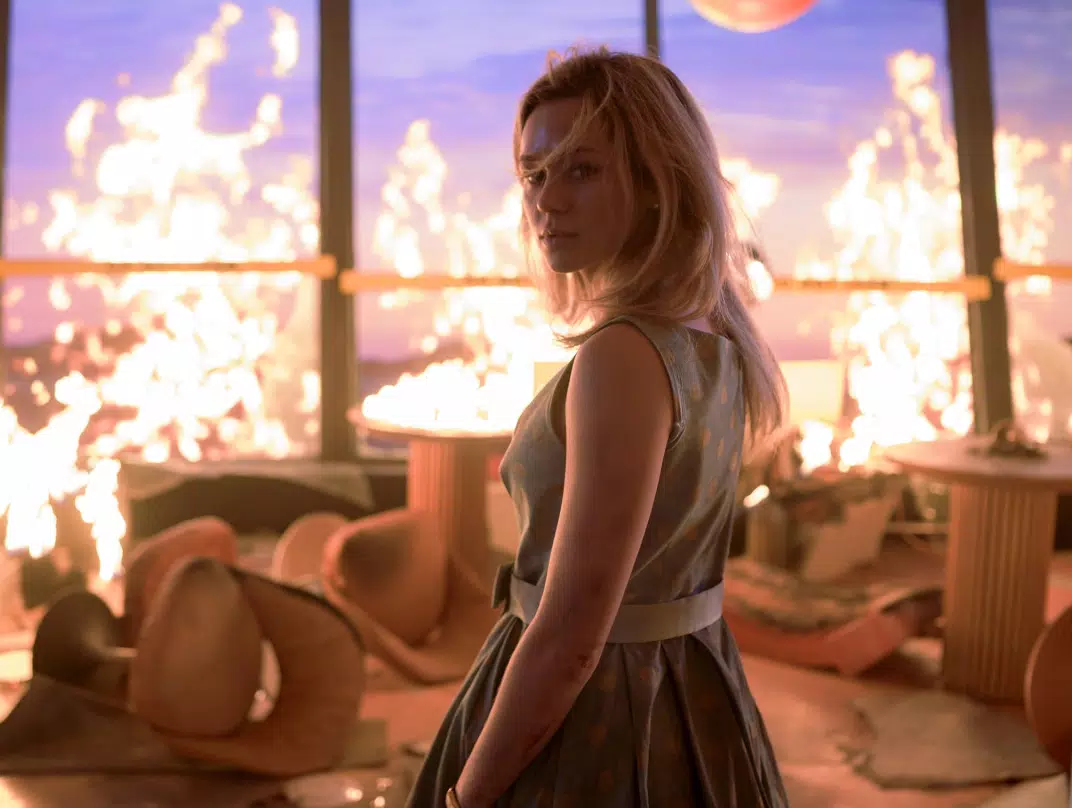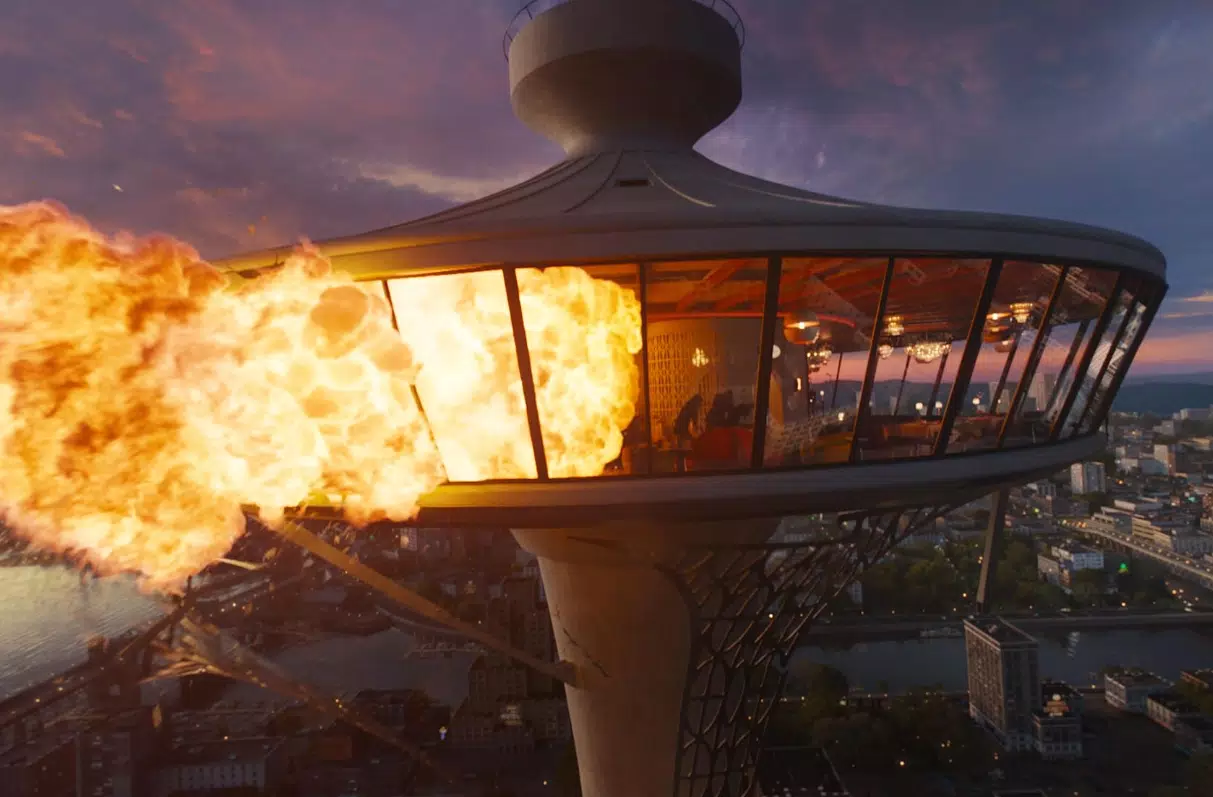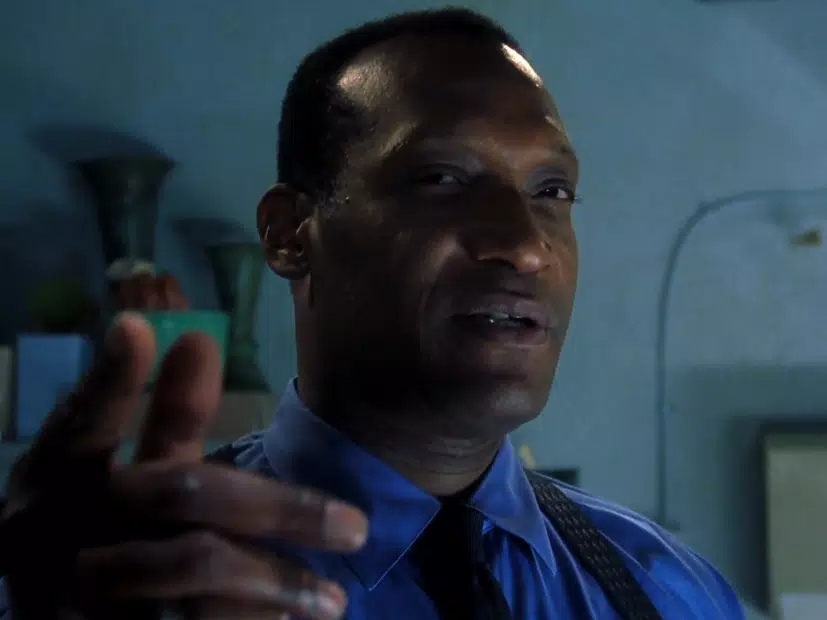
The 60s, somewhere in the United States. A young lady, together with her future fiancé, travels to a surprise location. She hates surprises, but we, the audience… many times love them. Creedence's "Bad Moon Rising" plays in the car, a song that talks about the troubled North American society during the Vietnam War, the sense of fatality and imminent instability but, mostly, about times of change. Such was the need of the most traumatic saga of all to reinvent itself that, in its sixth installment, it gives away the clues too early, but not to let us know how the protagonists will die, rather to make us understand that its mise-en-scène is pure symbolism.
The couple gets out of the car. He reveals the surprise to her: a reservation for a luxurious dinner at the formidable Sky View Tower, an architectonic structure so advanced for the time that just setting a foot in it is scary. The parallelism is evident. Ascend to the summit of a new type of horror or stay in our comfort zone? Iris, our protagonist, is the key to the narrative's double standard. Like in all prior installments, at the beginning, there's a colossal disaster involving many people, a trip back in time and a race against time.
But the twist is presented at an early stage, when we are shown that Iris isn't the one having these visions, but Stephanie is, her granddaughter, several decades later. The thing is, Iris is now in the same position as Clear Rivers was in this saga's second instalment: isolated, deteriorated… but, in this case, to post-apocalyptic levels. A home worthy of any The Walking Dead's fortress is what keeps this sixty-year-old woman safe, who unexpectedly welcomes a curious Stephanie in her house. Explanations are given, and Stephanie takes the legacy in her hands. It's time for blood.

What's death? A lightning that strikes close to us, a wind that slowly blows the bathroom's curtain, a log? Are they the signs we evade and don't want to see? Is it something beyond our understanding? Does it even have a shape? With the 90s boom of teenager stories and The X-Files' success, director James Wong—not to be confused with James Wan—was inspired by the plot of a somewhat forgotten 80s movie to start his own suspense/horror saga. And, almost unintentionally, he started a journey in which possibilities seem endless since the rival to be defeated is human being's oldest enemy, the one whose mere name gives us goosebumps and genuinely invites us to forget him, even knowing he will always be present.
There are no accidents with death. No coincidences, no mishaps… and no ways out. Every move we make, from mundane to monumental, the red light we stop—or not—for, the people we sleep with or the ones that reject us, the planes we travel in or the ones we get out of. Everything is part of death's sadistic scheme to take us to the grave. But what if we can trick the most relentless, invisible force of all to make it believe we aren't prepared for its long-awaited "moment" as an executor? In that first intriguing encounter between his character Bludworth and the young Alex and Clear, Tony Todd summarized the plot we held onto for years: nightmares of the underworld that made us doubt if driving behind a truck full of logs or going on a rollercoaster was the worst idea possible.

What if… we could control our departure date?
Due to this bloody and many times ridiculous exploration of the clash between life, survival and death presented 25 years ago, many traumas were left in the way. The first two installments gave us some of this century's most iconic deaths—grandly recycled in Osgood Perkins' hilarious The Monkey—but as the formula was repeated without much effort nor originality, something got lost. Final Destination 5 was the rotten cherry on top that crowned this bitter dessert served 14 years ago. An empty, innocuous attempt to catch the eye of non-fans—and apathetic people—who ignored the first movie's impact, and a new waste of time for those who, like me, had marveled at such comical but scary concept of death as an entity.
It wasn't until this year that the directing duo Lipovsky/Stein decided to give the saga a resuscitation shock with this new breath of fresh air titled Final Destination: Bloodlines. Yes, times have changed and the audience's interests have changed with them. As of several years ago, the horror genre has been transitioning with the symbolic incorporation of elevated horror, a progressive term that only shows the need many have of labelling and classifying everything that seems "different." Along the lines of putting families and relationships as the core of these stories—the most important ones probably are Ari Aster's Hereditary, Robert Eggers' The Witch or Jordan Peele's Get Out—the most primitive battle returned to present a feast of blood, guts and clever deaths that will become meme material in a couple of years—or months maybe, taking into account the current social media timings.
As it happens with death, at the time, we couldn't avoid mediocre sequels. It's time to turn the page. We are like a mouse being chased and pulled from the tail by a cat. In this case, the cat would be the equivalent to the lack of wit. Final Destination's core will always be the same, but it shouldn't end for this. It should be redefined, yes.But declared death? Never. Ultimately, death doesn't have an expiration date. I hope you are okay. Pay attention if you drop a glass cup, pick up all the broken pieces. Don't use too many piercings and, if you see an old coin, definitively get rid of it as fast as possible. See you soon. Or not.
Published on JUNE 5, 2025, 22:06 PM | UTC-GMT -3
If you liked this article remember to give it a 👉 LIKE, put it in your FAVORITES, COMMENT 🗣️ , and FOLLOW ME for more movie and series content 📽






Share your thoughts!
Be the first to start the conversation.